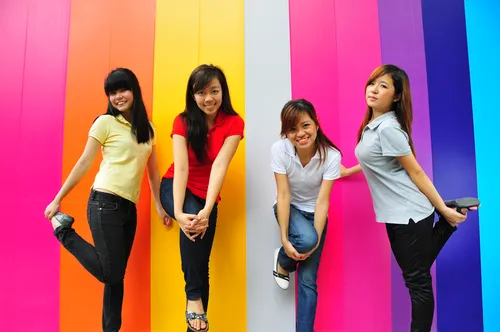
Millennials are out: What Singapore firms want from the Gen Z workforce
They comprise 30% of Singapore's resident population.
Millennials will soon be out as Generation Z comes in. A recent report by Hays noted that Generation Z members are now entering the Singapore workforce and firms are expecting a lot from them.
Gen Z comprises 30% of Singapore's resident population. Born between 1997 to 2010, Gen Z's are expected by employers to have skills that can’t be automated, understanding of the values held by older colleagues and the ability to moderate their need for instant gratification.
“For Generation Z, the workplace is exciting but daunting,” says Lynne Roeder, managing director of Hays Singapore. “This group grew up during the 2008 financial crisis and with threats from global terrorism and political uncertainty in the Middle East.
Roeder said this has made this generation more self-aware, self-reliant and driven. She furthered, "They are realistic, goal-oriented innovators who are constantly connected and ambitious. But they seek instant gratification and feedback, which a workplace does not always provide. They also know they’ll retire at an older age, so they want work to fit around their lives.
For this to be a reality, Roeder believes that Gen Z will need to have the skills employers’ demand, particularly as there is and will be more automation in the workplace. They must also find ways to finance their life choices if salary increases remain smaller than they once were and other factors such as the cost of renting or buying their own home take their toll.
Lynne also pointed out that Gen Z – like any new generation to the world of work – need to learn workplace etiquette and understand the values held by older colleagues, even for seemingly simple things such as acceptable use of a mobile phone at work.
“Employers must appreciate how using different devices is such an integral part of this generation’s life. Their attention span is short, but their ability to use different screens at the same time means they are often better at multitasking than other generations," Lynne stated.


![SBR 5 Lorem Ipsum News 2 [8 May]](https://cmg-qa.s3.ap-southeast-1.amazonaws.com/s3fs-public/styles/exclusive_featured_article/public/2025-05/a_hand_pointing_to_a_futuristic_technology_5b87c9d0e3_3.png.webp?itok=M3Hf-9XR)
![SBR 4 Lorem Ipsum [8 May Top Stories]](https://cmg-qa.s3.ap-southeast-1.amazonaws.com/s3fs-public/styles/exclusive_featured_article/public/2025-05/a_hand_pointing_to_a_futuristic_technology_5b87c9d0e3_2.png.webp?itok=2m5Wl0MX)


![Exclusive three SBR 12 Lorem Ipsum [8 May]](https://cmg-qa.s3.ap-southeast-1.amazonaws.com/s3fs-public/styles/exclusive_featured_article/public/2025-05/a_hand_pointing_to_a_futuristic_technology_5b87c9d0e3_11.png.webp?itok=8kn_UIfA)
![SBR 3 Lorem Ipsum [ Exclusive 2]](https://cmg-qa.s3.ap-southeast-1.amazonaws.com/s3fs-public/styles/exclusive_featured_article/public/2025-05/a_hand_pointing_to_a_futuristic_technology_5b87c9d0e3_1.png.webp?itok=YCyjLegJ)
![SBR 2 Lorem Ipsum [8 May]](https://cmg-qa.s3.ap-southeast-1.amazonaws.com/s3fs-public/styles/exclusive_featured_article/public/2025-05/a_hand_pointing_to_a_futuristic_technology_5b87c9d0e3_0.png.webp?itok=_cKD-29o)

![Video [Event News]](https://cmg-qa.s3.ap-southeast-1.amazonaws.com/s3fs-public/styles/event_news_featured_article/public/2025-05/screenshot-2025-05-08-at-4.58.53-pm_0.png.webp?itok=Kud35sMs)
![Event News SBR 9 Lorem Ipsum [8 may]](https://cmg-qa.s3.ap-southeast-1.amazonaws.com/s3fs-public/styles/event_news_thumbnail/public/2025-05/a_hand_pointing_to_a_futuristic_technology_5b87c9d0e3_8.png.webp?itok=DTh_dbYp)
![Event News SBR 9 Lorem Ipsum [8 May]](https://cmg-qa.s3.ap-southeast-1.amazonaws.com/s3fs-public/styles/event_news_thumbnail/public/2025-05/a_hand_pointing_to_a_futuristic_technology_5b87c9d0e3_7.png.webp?itok=vzDAzb6V)
![Event News SBR 8 Lorem Ipsum [8 May]](https://cmg-qa.s3.ap-southeast-1.amazonaws.com/s3fs-public/styles/event_news_thumbnail/public/2025-05/a_hand_pointing_to_a_futuristic_technology_5b87c9d0e3_6.png.webp?itok=jvHFc4P6)
![Video [Event News]](https://cmg-qa.s3.ap-southeast-1.amazonaws.com/s3fs-public/styles/video_thumbnail/public/2025-05/screenshot-2025-05-08-at-4.58.53-pm_0.png.webp?itok=yZnI0YBb)
![Video 1 SBR [8 May]](https://cmg-qa.s3.ap-southeast-1.amazonaws.com/s3fs-public/styles/video_thumbnail/public/2025-05/screenshot-2025-05-08-at-4.58.53-pm.png.webp?itok=9AAeRz_k)

 Advertise
Advertise

